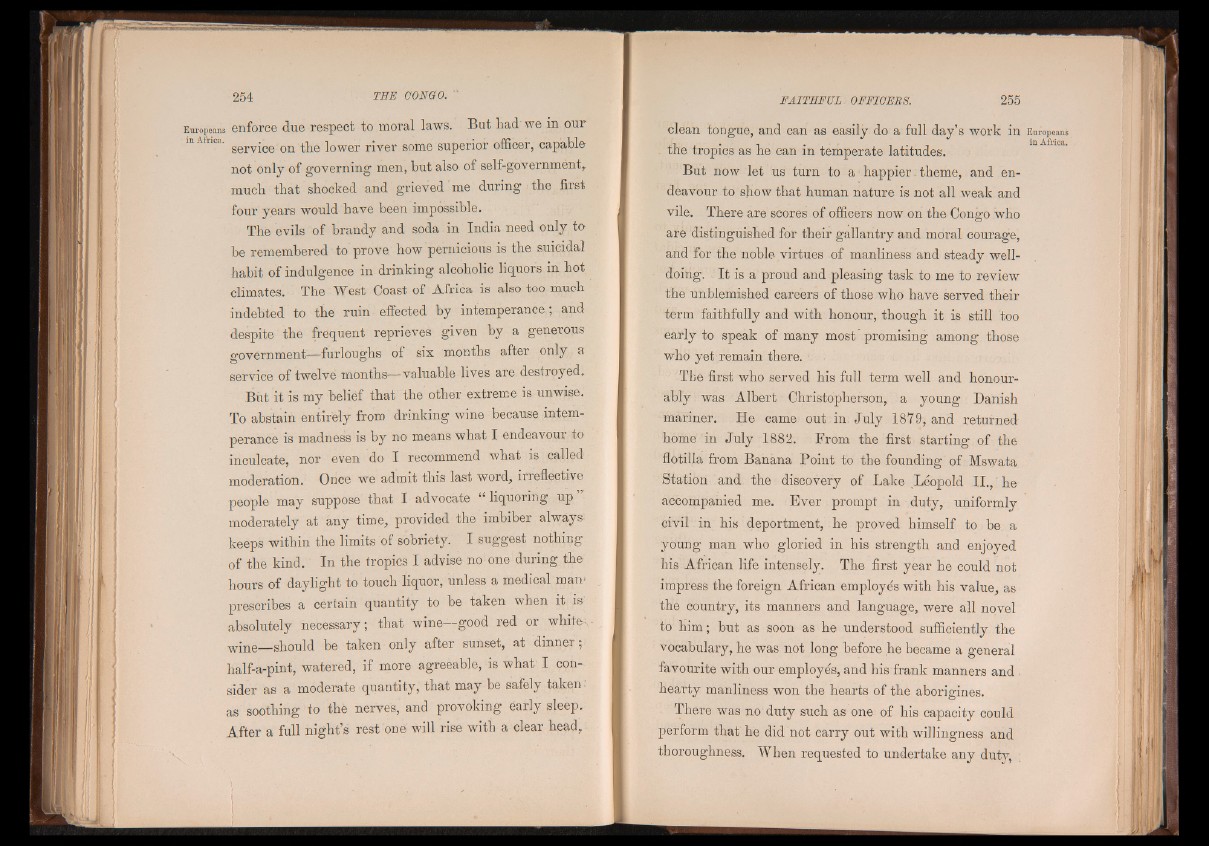
Europeans enforce due respect to moral laws. But had we in our
service on the lower river some superior officer, capable
not only of governing men, but also of self-government,
much that shocked and grieved me during the first
four years would have been impossible.
The evils of brandy and soda in India need only to
he remembered to prove, how pernicious is the suicidal
habit of indulgence in drinking alcoholic liquors in hot
climates. The "West Coast of Africa is also too much
indebted to the ruin effected by intemperance ; and
despite the frequent reprieves given by a generous
government—furloughs of six months after only a
service of twelve months—valuable lives are destroyed.
But it is my belief that the other extreme is unwise.
To abstain entirely from drinking wine because intemperance
is madness is by no means what I endeavour to
inculcate, nor even do I recommend what is called
moderation. Once we admit this last word, irreflective
people may suppose that I advocate liquoring up
moderately at any time, provided the imbiber always
keeps within the limits of sobriety. I suggest nothing
of the kind. In the tropics I advise no one during the
hours of daylight to touch liquor, unless a medical man'
prescribes a certain quantity to he taken when it is
absolutely necessary; that wine—good red or whitev
wjne—should be taken only after sunset, at dinner;
half-a-pint, watered, if more agreeable, is what I consider
as a moderate quantity, that may he safely taken'
as soothing to the nerves, and provoking early sleep.
After a full night’s rest one will rise with a clear head,
clean tongue, and can as easily do a full day’s work in European«
the tropics as he can in temperate latitudes.
But now let us turn to a happier. theme, and endeavour
to show that human nature is not all weak and
vile. There are scores of officers now on the Congo who
are distinguished for their gallantry and moral courage,
and for the noble virtues of manliness and steady welldoing.
It is a proud and pleasing task to me to review
the unblemished careers of those who have served their
term faithfully and with honour, though it is still too
early to speak of many most promising among those
who yet remain there.
The first who served his full term well and honourably
was Albert Cbristopherson, a young Danish
mariner. He came out in. July 1879, and returned
home in July 1882. From the first Starting of the
flotilla from Banana Point to the founding of Mswata
Station and the discovery of Lake Leopold II., he
accompanied me. Ever prompt in duty, uniformly
civil in his deportment, he proved himself to be a
young man who gloried in his strength and enjoyed
his African life intensely. The first year he could not
impress the foreign African employes with his value, as
the country, its manners and language, were all novel
to him; but as soon as he understood sufficiently the
vocabulary, he was not long before he became a general
favourite with our employes, and his frank manners and i
hearty manliness won the hearts of the aborigines.
There was no duty such as one of his capacity could
perform that he did not carry out with willingness and
thoroughness. When requested to undertake any duty,